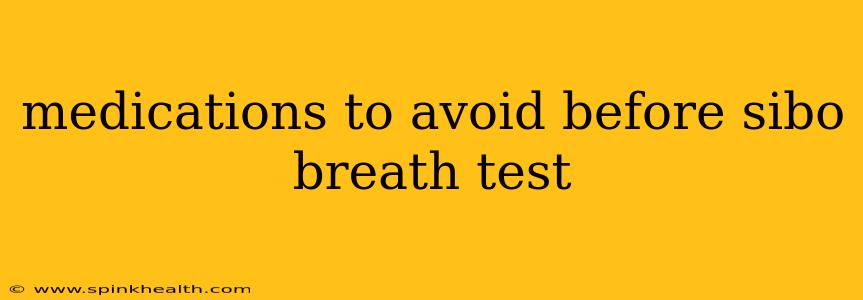Medications to Avoid Before a SIBO Breath Test: Navigating the Preparation Process
The small intestinal bacterial overgrowth (SIBO) breath test is a crucial diagnostic tool, helping doctors identify the presence of excessive bacteria in your small intestine. However, the accuracy of this test hinges heavily on careful preparation, including avoiding certain medications. This isn't just about getting a clear result; it's about ensuring your doctor can accurately assess your gut health and guide your treatment effectively. Let's explore the medication maze and what you need to know before your test.
My name is Dr. Anya Sharma, and for over 15 years I've specialized in gastroenterology, witnessing firsthand the impact of accurate SIBO diagnosis on patients' lives. This post reflects my professional experience and aims to clarify the vital role of medication avoidance in achieving reliable test results.
Imagine this: You've meticulously followed your doctor's instructions, fasted correctly, and arrived for your SIBO breath test feeling prepared. But an overlooked medication could throw off the entire process, leading to an inaccurate diagnosis and potentially delaying effective treatment. Understanding which medications to avoid is paramount to ensuring a clear and reliable result.
What Medications Can Interfere with a SIBO Breath Test?
Many medications can affect the gut microbiome and interfere with the test's ability to accurately measure hydrogen and methane gas production. These medications can either mask the presence of SIBO or falsely indicate its presence. Here are some key culprits:
-
Antibiotics: This is the most obvious one. Antibiotics kill bacteria, naturally impacting the results of a test designed to measure bacterial overgrowth. You'll need to stop taking antibiotics well before your test. The exact timeframe will be determined by your doctor based on the type of antibiotic and your individual circumstances.
-
Proton Pump Inhibitors (PPIs): PPIs, commonly used to treat acid reflux, can alter the stomach's environment, potentially influencing bacterial growth and gas production. They may need to be stopped before the test. Your doctor will advise on the necessary discontinuation period.
-
Laxatives: Laxatives speed up bowel movements. This can affect the collection of gas samples needed for an accurate test result. Avoid laxatives before your breath test.
-
Bismuth subsalicylate (Pepto-Bismol): This over-the-counter medication contains bismuth, which can affect the test's readings. It should be avoided before your test.
-
Metronidazole and other antimicrobials: These medications, often used to treat infections, can impact gut flora, potentially affecting the accuracy of the SIBO breath test.
-
Acid reducers (H2 blockers): Similar to PPIs, H2 blockers can impact stomach acidity, which might interfere with the gas measurements during the test.
How Long Before the Test Should I Stop Taking These Medications?
This is where personalized advice from your gastroenterologist is crucial. There's no one-size-fits-all answer. The necessary discontinuation period varies depending on the medication, its dosage, and your individual health status. Your doctor will consider these factors when determining the appropriate timeframe. Never stop taking any medication without first consulting your doctor.
What if I Need to Take Medication for a Chronic Condition?
Managing chronic conditions while preparing for a SIBO breath test can be challenging. It's vital to discuss this with your doctor well in advance. They may suggest alternative management strategies during the preparation period or may determine that the potential risks of stopping essential medications outweigh the benefits of a perfectly precise breath test. Together, you can create a plan that balances your health needs and the accuracy of the test.
Can Certain Foods Interfere with the Test?
While the focus here is on medication, it's also important to remember that certain foods can influence test results. Your doctor will provide specific dietary guidelines for the days leading up to your test, often including a low-FODMAP diet.
The SIBO breath test is a powerful diagnostic tool, but its success hinges on proper preparation. By understanding the medications to avoid and working closely with your physician, you can maximize the test's accuracy and gain valuable insights into your gut health. Remember, open communication with your healthcare provider is key to a successful and informative testing experience.

